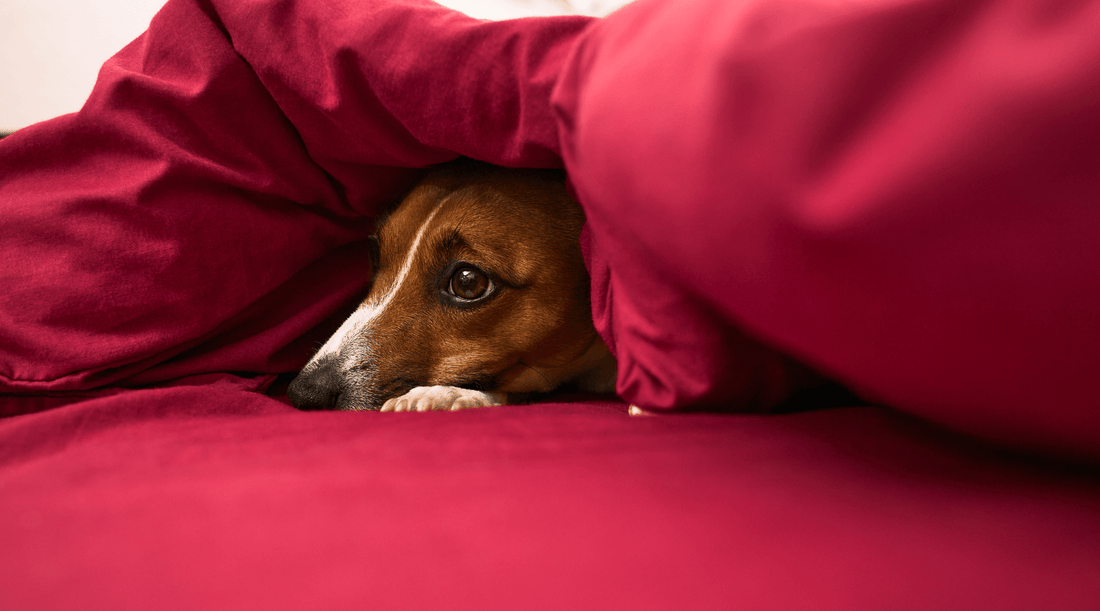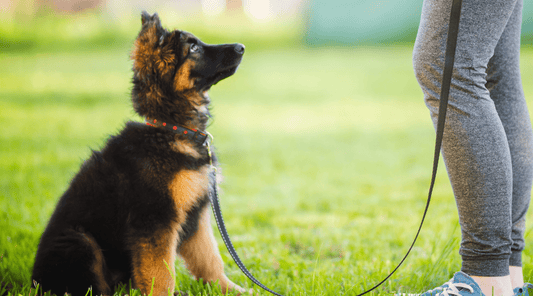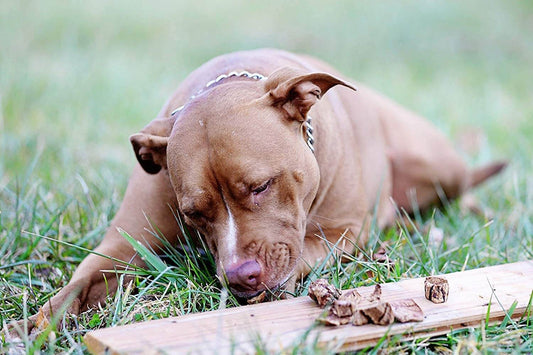
Understanding and Managing Dog Anxiety
Dawn Miller Jan 24, 20255 Minute ReadDog anxiety should never be ignored. Staying in a heightened state of alert can damage the immune system, digestive system, and overall health. It's critical to recognize the signs of anxiety in dogs and to explore natural remedies and calming products.
A while back, my lab mix Bruno and I were settling in for a relaxing evening when suddenly, Bruno started acting strange. He began panting while pacing around our home. What my partner and I didn't realize at the time was that a thunderstorm was rolling in. And Bruno could hear those distant thunderclaps long before our human ears could register them.
Fortunately, we had been working on some strategies to relieve dog anxiety, and I was able to use them to help Bruno find his safe place and weather the approaching storm.
Signs of Anxiety in Dogs
Dogs can’t tell us when they’re anxious in words. But they shout it loud and clear in their own way if we pay attention to these signs of anxiety in dogs:
- Excessive Panting or Drooling - If it's not a hot day or Bruno hasn't been running around, this is definitely a red flag.
- Restlessness or Pacing - This is particularly common during specific triggers like storms or fireworks.
- Destructive Behavior - Chewing furniture, scratching doors, digging, tearing up your brand-new running shoes
- Vocalization - Increased barking, whining, or howling
- Avoidance or Hiding - Seeking out quiet, confined spaces.
- Physical Symptoms - Vomiting, diarrhea, or loss of appetite
What Causes Dog Anxiety?
Not every dog reacts to the same things. But some commonalities exist. Dogs often express acute anxiety due to:
- Separation Anxiety - Dogs have been bred to be our companions, to defend, comfort, and help us "hunt". So, the fear of being left alone is one of the most prevalent forms of anxiety in dogs. It's like we're not letting them do their job.
- Loud Noises - Thunderstorms, fireworks, or even loud household appliances can trigger anxiety. Dogs can hear much higher frequencies than humans. This means dogs hear things we can't hear yet (or won't), and they sound much louder. Dogs with pointy ears have the best hearing, while dogs with floppy ones are spared some volume.
- New Environments - Moving to a new home or encountering unfamiliar places can unsettle dogs.
- Trauma or Past Experiences - Rescue dogs like Bruno may carry baggage from previous abuse or neglect. As adoptive parents, we're not always aware of what they've been through.
- Lack of Socialization - Dogs that weren’t exposed to various environments, people, and other animals early in life may struggle with anxiety later. Slowly increasing the people and places they know can help.
- Lack of Training - Lack of basic training, such as sit or come, can enhance existing anxiety because dogs don't know how to act in certain situations. And their pet parents may become frustrated with them more often.
- Boredom - Little-known fact. Lack of mental stimulation can cause a dog to turn inward, focusing more on their fears and sensing heightened stress responses to even the most minor things.
Everyday Stress Vs Anxiety
It's important to realize that dogs have normal stress responses like you do. When you get startled, you feel your pulse, and maybe you sweat. Then you calm down when you realize it's nothing and return to your day. Dogs do this, too!
Stress crosses the line into anxiety when it becomes chronic. Your dog doesn't recover quickly after something that causes alarm. They seem scared of the littlest thing and stay alert for long periods.
How to Manage Dog Anxiety
You have many other effective strategies to try before it gets to anxiety meds territory. These tips for managing dog stress can completely eliminate dog anxiety for most pups.
1. Create a Safe Space
I'm a huge fan of crate training. When constructively presented to your dog, the crate becomes their wolf's den—a smaller, protected place they can go when they need extra safety.
Put it in a cozy corner. Add a blanket. Introduce the comfy crate with commands and positive reinforcement.
I use beef lung training dog treats as rewards.
And once they're in the crate, I give them a meaty dog bone to encourage them to stay awhile.
2. Establish a Routine
Predictability in their day reduces stress and anxiety. Stick with regular feeding times, walks, chew and play sessions as close to the same times as possible.
Dogs are more aware of the passage of time than many of us realize. A routine gives them something to look forward to, which can take the focus off the things causing stress.
3. Use Natural Remedies for Dog Anxiety
Natural remedies for dog anxiety often contain healthy fats like omega 3 and 6. These are anti-inflammatory immune system supporters that can modulate stress responses.
Foods rich in B vitamins, especially B12, also support mood and mental health.
Antioxidants are fundamental stress relievers. They support healthy cellular division and function, which affects everything in the body. So, getting some anthocyanins from blueberries and quercetin from apples pumpkin, or butternut squash into the diet is a great way to support healthy stress responses.
I buy meaty beef marrow-filled dog bones and refill them with natural anxiety relievers like these... after that omega 3/6-rich bone, B12-loaded marrow is gone.
It's important to select all-natural omega-3-rich dog bones.
And make sure you choose grass-fed beef bones.
Grass-fed beef has 2.5X more omega 3 and less saturated fat.
4. Provide Mental Stimulation
Try mentally stimulating your dog during a scary event like a thunderstorm, fireworks, or a trip to the vet. Give them a marrow bone.
A Marrow-filled dog bone is like an all-natural dog puzzle toy. In the wild, my K9's ancestral wolves chew on bones for entertainment, to alleviate boredom, and to manage stress.
As they chew, lick, and twist the bone, a little bone marrow comes out. It's slightly sweet and so nutritious. This feels very rewarding to your dog.
Giving your dog a bone several times a week between events also supports a more balanced stress response.
5. Try Calming Dog Products
These might include items like a mama dog pheromone diffuser that gives your dog the subconscious sense that their mom is nearby, which can ease stress.
Dog thunder vests can also be effective for some pups. Like a weighted blanket, it simulates a hug, stimulating calming hormones.
And, of course, I've found dog bones to be some of the best calming dog products. They can really hold their attention.
6. Practice Some Dog Training
Dogs can learn over 120 distinct human words. This makes them very responsive to training. Training can reduce the signs of dog anxiety because training builds trust. And they learn to look to you for guidance in a situation.
So, let's say my terrier, Pixie, is pacing during an evening of fireworks, I can say, "go to crate". She follows the command.
I then see her peacefully chilling in her crate with no more signs of distress. "Sit", "stay", "come", and "down" commands can also be useful depending on where we are during the stressful event.
To learn more about dog training and how it can alleviate the signs of dog anxiety, I encourage you to check out this Free 7-Day Dog Training Challenge.
Available On:





